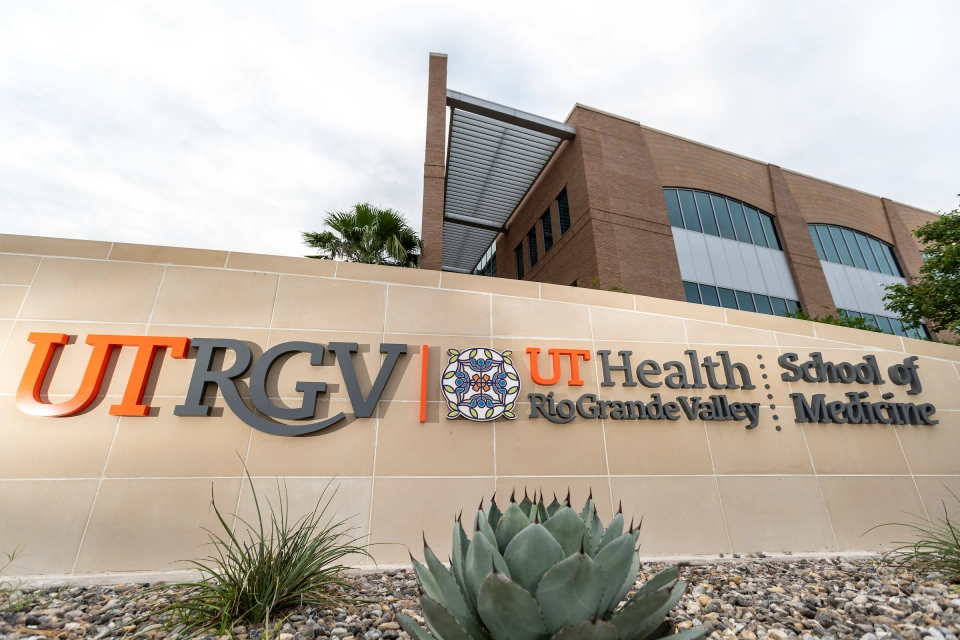
(UTRGV Photo)
News Release | Health

(UTRGV Photo)
Tuesday, October 24, 2023
Health
By Saira Cabrera
RIO GRANDE VALLEY, TEXAS – The UTRGV School of Medicine has been awarded $2,275,863 to establish the first of its kind "Maternal Health Research Center" in the Rio Grande Valley.
The "Maternal Health Research Network (MH-RN) for Minority Serving Institutes (MSIs) – Research Awards" grant – awarded by the U.S. Department of Health and Human Services' Health Resources and Services Administration – will establish the UTRGV Maternal Health Research Center. It will be one of 16 minority-serving institutes across the country forming a research network to conduct maternal health research.
The grant aims to integrate mental and behavioral healthcare and resources into the routine as part of the maternal health process.

ADDRESSING HEALTH DISPARITIES
Dr. Candace Robledo, associate professor in the UTRGV School of Medicine and principal investigator for the grant, said the award will help address health disparities in maternal health across the Valley.
"This grant will allow us to build our capacity to conduct research to address health disparities in maternal health outcomes and help design and inform community-based solutions to address these disparities," she said. "It will help advance health equity across the Rio Grande Valley."
For the past eight years, efforts from the UTRGV School of Medicine’s faculty have focused on increasing mental health access and parity through the Primary Care Behavioral Health (PCBH) integration model.
Several times during those eight years, the UTRGV School of Medicine's population health and family medicine faculty jointly applied for funds to increase maternal health outcomes through integrated behavioral health.
With this grant, the PCBH model's consultant approach will be extended into the community through promotoras (community health workers who serve in the Valley’s colonias to provide healthcare).

"What that has done for us is it has allowed us to create a workforce development pipeline, both for the physician and mental health workforce," said Dr. Deepu George, associate professor at the UTRGV School of Medicine and co-principal investigator for the grant. "With this grant, we’re extending that same strategy to the community health workers, the promotoras."
The award will allow for research to better understand why women living in the Valley are less likely to have positive health outcomes compared to women in other parts of Texas and the United States.
"We suspect that depression, anxiety and other behavioral factors are to blame," Robledo said. "We hope to adopt an integrated behavioral healthcare approach to be delivered in community settings by promotoras to help us meet those needs and address those challenges."
Dr. Michael B. Hocker, senior vice president for UT Health RGV and dean of the UTRGV School of Medicine, said this award underscores the need for research to address behavioral factors that affect pregnancy-related complications in women living in the Rio Grande Valley.
“The Valley is such a compelling place for this type of research,” he said. “It is an underserved region, where health disparities and adverse outcomes – such as preterm and low birthweight births – persist for Hispanic women.”
A MENTAL HEALTH SHORTAGE AREA
The Rio Grande Valley is considered a mental health shortage area, meaning there are not enough professionals with the expertise or background to meet the community's needs.
To address that, George's team has been integrating PCBH training to ensure primary care providers and behavioral health consultants are available to meet the needs of Valley communities.
"This grant will further extend those efforts and provide the means, so female patients don't have to come to the clinic to receive these services or aid," Robledo said. "We think that for women having access to someone very trusted within their community, like a promotora, it would be beneficial during pregnancy and after delivery."
The grant, according to Robledo and George will bring an opportunity to participate in research and increase the maternal health workforce available to provide adequate support to women living in the Rio Grande Valley and address important drivers of maternal health disparities in the region.
MINIMIZING ACCESS BARRIERS
The grant aims to integrate mental and behavioral healthcare and resources into the routine as part of the maternal health process.
"Hopefully, we can minimize access barriers and decrease stigma," Robledo said, "because we're tying mental healthcare to women's role as mothers and caregivers. We want to learn how we can help them be the mothers they want to be and promote mental health through their prenatal and postnatal care."
The UTRGV Maternal Health Research Center will be able to address the broad range of health needs of moms within the diverse populations of the Rio Grande Valley, and promotoras will be an integral aspect.
The research efforts will be uniquely situated to include a vulnerable population that is often not participating in research.
"We are committed to maternal health and improving maternal health in the region," George said. "It took a lot of effort to identify this funding source. We are ecstatic that we finally were able to bring it in, because we've been working on this for a while."
The center's first year will focus on planning and coordination and generating evidence that will help build on research and treatment. Efforts will lead to a full-service center that will help improve maternal health and create equitable healthcare opportunities for underserved women in South Texas.
"This work is highly personal for me," Robledo said. "My family was affected by our region’s lack of public health infrastructure. To be able to conduct work that can help reduce health disparities in our area has been a long day coming. I'm elated that we can do this work here locally and for the impact we will have."
Other grant participants include Lupita Hernandez, Myrna Ruiz, Salvador Arrellano, Maria Machuca, Michael Machiorlatti Ph.D.,and Cliff Clark. The research also will be conducted in collaboration with community-based organizations like the South Texas Promotoras Association.
ABOUT UTRGV
The University of Texas Rio Grande Valley (UTRGV) was created by the Texas Legislature in 2013 as the first major public university of the 21st century in Texas. This transformative initiative provided the opportunity to expand educational opportunities in the Rio Grande Valley, including a new School of Medicine and a School of Podiatry, and made it possible for residents of the region to benefit from the Permanent University Fund – a public endowment contributing support to the University of Texas System and other institutions.
UTRGV has campuses and off-campus research and teaching sites throughout the Rio Grande Valley including Brownsville (formerly The University of Texas at Brownsville campus), Edinburg (formerly The University of Texas-Pan American campus), Harlingen, Weslaco, McAllen, Port Isabel, Rio Grande City and South Padre Island. UTRGV, a comprehensive academic institution, enrolled its first class in the fall of 2015; the School of Medicine welcomed its first class in the summer of 2016, and the School of Podiatric Medicine in the fall of 2022.